At Today’s Hip Hop, we operate with two primary missions in mind. One, is to curate the best in new releases, showing equal respect to emerging and established talent. The second is to provide independent artists with the information, tools and resources necessary to build a successful career.
In today’s feature, we combined these two elements, interviewing artist managers of talent we’ve previously featured on the blog before. And picking the brains of the talented industry executives that manage this talent. Our hopes are to give artists at all stages of their career valuable information about the job of an artist manager. And young professionals looking to make their name in the industry with a blueprint to navigate the complex world of talent management.
Let’s meet the managers who will be sharing from rich experience and diverse backgrounds. Keep in mind the needs of every artist are different based on the size of their fanbase, goals, and personality. You’ll notice that all of the managers interviewed have business ventures outside of their managerial career. This speaks to the entrepreneurial spirit necessary to succeed in this ultra-competitive space.
Vernon Jones
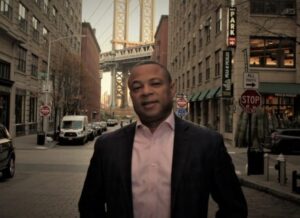
CEO and Founder of Digital Media Marketing Agency JIG Media, Vernon relies on over 25 years of marketing and sponsorship experience. He’s applied that knowledge as manager of Independent Hip Hop Icon Kota the Friend. Vernon is a pioneer of independent artist management, encouraging artists to take ownership of their career, and unlocking groundbreaking opportunities for FLTBYS and Kota alike.
Steffi Gibson
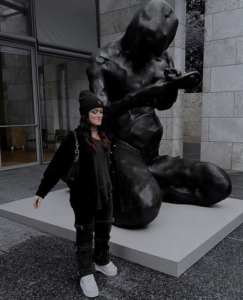
Artist Manager for LA rap group Bungalow Collect, and Dallas emcee Ren the Third, Gibson’s talents as a music curator and talent evaluator have allowed for her to take the independent hip hop scene by storm. Her artists benefit from a broad array of performance opportunities and her keen sense as a community builder.
Steven ‘Flow’ Pacheco
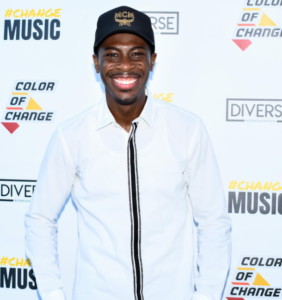
A pioneer, and entrepreneur in the truest sense, ‘Flow’ manages an array of artists including JMB Juvie, Wavvii Baby, and Hello O’Shay. He also represents producer Nigel Uno and visual artist 99visions. With six years of experience in the music industry, his emphasis on innovation and impact for artists is felt through each of his artists. ‘Flow’ puts a noticeable focus on giving back to the industry, offering great tips for emerging artists, and consistent knowledge about the culture on the whole.
Jaxon Buzzell

Jaxon exemplifies the qualities of a modern-day renaissance man. From his undeniable talents as a video director and photographer, to his precise and thoughtful artist management. Buzzell manages LA collective grouptherapy., and LA lyricist Ajna. Outside of executive duties, Jaxon is the founder of modrnation, a burgeoning platform for music discovery through interviews, blogs music videos and more. Modrnation recently released the first print version of their magazine.
Now that you know the cast, read on for their career-changing perspective for artists and managers alike.
In your eyes, what does it take to be a good manager in the 2022 landscape?
Vernon Jones: You have to make sure everything you do is in the best interest of the artist. A good manager should have the ability to identify opportunities that others might not recognize. The artist’s job is to create music and the manager needs to perform all other duties that will allow the artist the time and resources to do what he/she does best. The manager should understand how to connect the dots when it comes to PR, marketing, partnerships, shows and collaborations. I would also encourage artists to hire managers who understand business, not just the music business, but business in general.
Steffi Gibson: Being a good artist manager in 2022 takes patience and consistency. There is a huge investment period that comes with managing a new artist. You have to set your intentions and work towards those goals every single day. Success in the music industry does not happen overnight, regardless of how it may seem online for some.
Steven ‘Flow’ Pacheco: You have to have vision, be an agile leader who puts the team and mission above all, and the ability to make things happen (especially things that have a slim chance of happening). While managers usually don’t get paid unless the artist gets paid, all good managers understand their role is never about them (but make sure you’re valued no matter your situation/circumstance).
Jaxon Buzzell: Being a manager today is about seeing the bigger picture for whoever you’re representing and being able to put the artist’s needs before your own. The core job of a manager in my eyes is to bridge the gap between the artist and the industry, and to do whatever it takes to properly and effectively communicate their vision to the rest of the industry. To not only have the foresight to plan ahead, but also be able to think on your feet and create an opportunity when nothing is there. My ultimate goal going into a management relationship with an artist is to foster a career full of longevity without sacrificing creative integrity, and I feel building a personal relationship with the artist always comes first so you can truly understand them both as artists and people in order to portray their story and vision in a truthful and attention grabbing way.
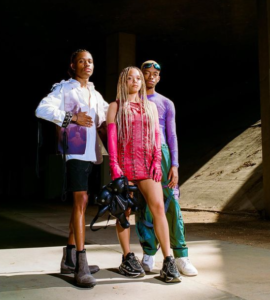
Jaxon’s grouptherapy. have capitalized on immense opportunities in 2022
What does it mean to represent an indie artist vs. one who is signed?
VJ: With an Indie artist there’s a lot more work that goes into it because you have to really understand the artist’s goals and dreams, and then help them to make those dreams become a reality. You need to understand how to maximize the artist’s value and earnings, which includes making sure the artist is set up to collect publishing royalties and streaming revenue. Working with Indie artists is like working with a business owner, because they own and operate their own brand. Your job is to make sure you help them to stay on brand and remain independent. A label artist is more like a worker. They don’t truly own their brand. The label has a big say in how they are branded and the label kind of pulls the strings. Managing a label artist includes working directly with the label. The label is ultimately in charge. I know label artists don’t like to hear that but once they sign that label deal, it is what it is. The simple way to put it is working with an Indie artist allows you to be innovative but working with a label artist is straight music industry basics. There’s no room for creativity or innovation, at least until the label recoups all of their money.
SG: Representing an indie artist means putting in work. Artists that are signed have a ton of resources and team members working for them. When you’re an independent manager, you and the artists are the team. It’s a lot of work, but the payoff of remaining independent is huge.
SFP: Representing an indie artist versus a signed artist means you’re comfortable taking the stairs and you are looking to build a long-term relationship with the artist for sure. Money is what keeps a business afloat, but you have to be comfortable with your ROI taking longer to materialize in most cases. And with the conditions present in 2022, representing an indie artist is very much about figuring out how to have a healthy, proficient “balance” between whatever the artist does to pay their bills and their music career until they can focus on their music career full-time. Still, when things pay off on the indie grind, you’ll see so much more of the money and rewards you gain than you would representing a signed artist. One of the main points I aim to drill home with indie artists is that they have the luxury of full creative control and more room to experiment without the added pressure of being signed to a major label that has competing obligations and more leverage than you do over your own career. That counts for more than an indie artist (and even a signed artist) may realize when the road gets rough.
JB: There’s no definitive answer on whether indie or signed is a better situation for every artist, I feel it truly depends on the artist, manager, and the strength of their relationship. It not only takes a manager-artist duo with a self-starter state of mind and experience in many fields, but it also requires another level of trust that you may not always find between a manager and signed artist. From the start, I’ve always made an effort to learn every aspect of the industry even if it’s just surface level knowledge, and I feel that has helped me support the indie artists I work with to an extent we’re satisfied with and can see success coming from. Being independent is a longer road, more hours will be put in and the financial rewards may be delayed, but finding independent success as an artist leads to financial freedom, artistic freedom, and true freedom with every aspect of your life as you’re a self-employed artist.
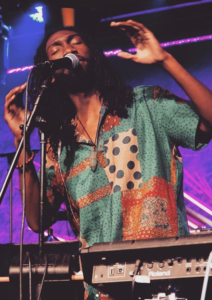
‘Flow’ managed Hello O’Shay performs at NYC Flight Night
What are some of the common challenges or tough decisions you face in your work?
VJ: As a manager for an Indie artist the biggest challenge is wearing so many hats. You kind of take on the job of 5 people. You have to put together a team, that might include a mix of staff and third party vendors, you have to make sure their deals are in place and cleared with your attorney, work with the artist on PR and marketing. And you have to keep the artist on task because by nature an Indie artist is their own boss so they are always coming up with new ideas. I tell Kota to let me know his dreams and ideas and I’ll work to make sure they become a reality. It’s as simple as that. Kota is multi talented so it’s a blessing and a curse. It’s a blessing because he can do everything from writing songs, arranging music, shooting and editing videos and coming up with marketing concepts. The curse is that sometimes it’s hard for me to get him to understand that sometimes we need to allow others to take some of the slack so he can get even more done. I think we’re getting to a nice balance. I mean he’s really good at all of that stuff so it’s hard for me to find people who can do those things better than him.
SG: Making sure we’re investing our time and energy into the right things. We live in a very unpredictable time in hip-hop, and it can be hard to distinguish the real from the fake. It’s important to trust your gut, and surround yourself with people that inspire you.
SFP: Balancing what’s personally important to my artist/client versus what’s important for the business and their brand is one of my biggest challenges in the business. The toughest decisions are typically when the artist and I have opposing/differing views on what or how something should be done to advance their career. Fortunately, I started out as an artist so I have more of a dual perspective compared to many of my artist managing peers. But, when an artist feels like they know better than you do as a manager, it takes a great deal of trust to be built and some serious coaching to talk them off the ledge even if they think what they’re doing is for their greater good. The tricky part about it is sometimes you both can have a subpar outlook on the tasks at hand and you won’t truly know what the best decision was until after you’ve made it already. Lastly, I’d say managing expectations, keeping things in perspective for the artist, and keeping them motivated (when results fall short or take longer than anticipated) are some of the everyday challenges of being a manager. If you can master these three things, you’re on your way to being a good manager for sure.
JB: First thing would be balancing the needs and priorities of the artist with what I feel is going to be best for their business, it’s important to keep the artists vision but it’s a managers job to deliver that vision in a way that will be well-received by the music industry and the artists’ listeners. I’d also just say the personal challenges of being a manager, I find it important to have a personal relationship with the artists I work with as well, as I feel it gives me a stronger understanding of them as artists and people as well as making it easier for us to have honest conversations for the sake of their career. It’s a mentally and emotionally draining job at times, but that’s also what I love about it, the personal investment and love for the people and projects I work with.
How are you using social media as a tool to advance your artist’s career and your own?
VJ: For me it’s all about the artist because I’m not trying to manage other artists. In my case, Kota is great at social media because of his creativity. In 2023 it’s going to go to another level. I operate the FLTBYS brand as well so that’s the social media that I oversee for Kota. We use social media to promote the FLTBYS and Kota the Friend brands. At the end of the day we try to keep the two brands separate because we will be bringing on other artists under the FLTBYS brand, which Kota founded when he was in high school, and that’s the brand where all the business happens. Kota’s life has been an open book for the most part so he just keeps it simple as an Indie artist. He posts what he feels like and when he feels like it. He’s pretty on point with it so I just look at it and give my advice here and there but for the most part he’s usually right on his instincts so sometimes I ask why he did this or that and he always has a reason for it and he’s been successful so I wouldn’t do anything to interfere with something that works. And he evolves and makes adjustments when needed.

FLTBYS continues to grow as a brand under VJ’s watchful eye.
SG: I push my artists to be themselves and be authentic online. The biggest reason I’ve become a super fan of an artist is a combination of two things: enjoying their music, and liking who they are as a person. I know it sounds corny, but I think the best way to gain a real fanbase is to be yourself.
SFP: At first I was using it as an additional marketing/promotional tool for my artists and my entrepreneurial endeavors. Now, I use it to showcase my personality, inspire/motivate people, and spread helpful information or wisdom that I feel people can use in their line of work. By doing this I am simultaneously building brand trust/my reputation and adding value to my community while keeping people engaged in the different aspects of the careers of both my artist and I. If I’m not having fun or creating from a place of joy and altruism as a content creator, the person on the other side of the screen usually isn’t enjoying the content or gaining anything from it. That’s my rule of thumb with social media.
JB: Social media is an artist’s strongest asset today, especially an independent artist. I always advise the artists I work with to approach it as they would their art and keep it personal to you, people want to see the little things that make you normal. If you have a day job, make a TikTok or story post of you at work, people want to see that you’re a real person who they can talk to. That’s what grows a real, invested fanbase. In an era where an artist can have millions of streams but sell very little tickets to a show, I make it a priority to grow a physical presence at the same pace of growing a streaming presence, make yourself just as big as your songs. With that said, that pertains to the artists I work with, depending on the lane of music you make and the image the artist wants to uphold then I may take a different approach.
With my personal social media, on my personal page I stick to posting my work, I wasn’t big on socials before working in music. For my brand, modrNation, I take a very different approach than what I said about artists. I aim to uphold a posting schedule with consistent branding, but I’ll still throw in personal humor on stories, video BTS, and reflect on accomplishments with posts so people feel invested in the story of the brand, not just when we do something cool every now and then.
What are your thoughts on merch or physical records as an additional revenue stream?
VJ: Merch and physical records are crucial. Brands like Nike have been using athletes and entertainers for years, to sell their products, so why not create your own products and sell them yourself. That’s simple business. Artists are celebrities and celebrities help brands sell products. But again, you have to understand business as well or you can just be throwing money in a black hole if you don’t understand expenses vs income and profit. Physical records are making a comeback. Whenever we release vinyls they sell online immediately and when we have them available at shows we always sell out. I gave Kota the idea of buying a commercial building in Harrisburg, PA, of which he uses the first floor as the FLTBYS flagship store, so that tells you how I feel about merch. Make no mistake about it though I would never tell my client or artist to rent a retail space to sell their merch. Why not just own the building? You can sell your merch, own real estate and generate additional revenue by renting out the rest of the building. This is long term wealth that I think a lot of artists miss out on. As a global artist it doesn’t matter where your physical store is located because people from all over the world will order online. You will never earn as much from the retail location as you will earn online. It’s hard to keep vinyls in the store.
SG: Merch and physical records are cool, and there’s definitely a market for it. Is it necessary for up and coming artists? Honestly, no, because production can get really expensive. But I definitely think it’s important to create down the road. I still have merch from concerts from 10+ years ago.
SFP: Creating and selling merch is necessary. Same goes for selling physical records/goods. These are two of the key indicators to how many fans you truly have in my book. Plus, you need to give your supporters as many different ways and opportunities to engage with your brand and support you as an artist. It distinguishes you from most other artists and shows your fans and potential fans alike that you take your craft and brand seriously without a doubt. From a business standpoint, you will NOT be able to survive nor compete in this business without selling merch and physical records/goods.
JB: While I do feel that merch and physical sales are important, an artist should also know their audience and not put their funds into merch until necessary. It’s important as an artist to have as much content for new fans to look through as possible, when someone finds your music ideally you’d have multiple social media platforms, music videos, a back-catalog, etc for them to look through and become devoted fans. Once you hit a certain point as an artist and have the funds to do so, merch is absolutely necessary, it can help fund a tour, build a devoted fanbase, and contribute to your visual branding as an artist. If you’re a smaller artist with maye less resources, I’d recommend looking into a crowd-funded site such as Qrates for vinyl or Everpress for merch.
What opportunities are you seeking for your artists outside of their music?
VJ: The great thing about Kota is that he doesn’t like to spend money on cars or jewelry so that makes it easier for me when I’m showing him real estate that he can purchase for long term wealth that he can hand down to his children. I worked in the sports marketing and media world for many years and I would always say why don’t athletes buy one income producing property every year and when they retire they will own 15 properties, of which each might have 1-10 units in it. They would have amassed a real estate empire that would appreciate in value and they would earn a lot of money after their playing days. So I just told Kota that concept and he gets it. So outside of music it has to be income producing real estate. Not mansions or anything like that because that’s just fantasy island stuff. The real money in real estate is income producing properties. We’re looking at possibly developing empty lots as well. So it’s real estate and music royalties.
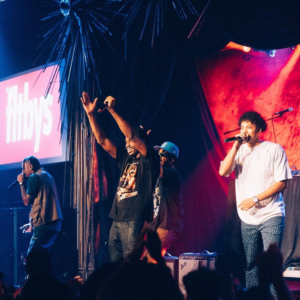
Gibson’s ‘Bungalow Collect’ perform at NYC Flight Night
SG: Songwriting for other artists, working in creative direction with fashion brands, creating music for movies and TV shows, you name it. Every artist I work with has talents in multiple areas, it’s honestly insane. I want to help them shine however they want to. It’s more than just music.
SFP: Ever since I became a public figure and gained a thorough understanding of the role media plays in our society and economy – especially the attention economy – I’m laser-focused on creating a media extension to all of my artists’ teams and brands. Music itself is a form of media, but having the artist be intentional and proactive on how they can create endless forms of media that allows them to express themselves and speak to who they are is the pathway to unlimited opportunities. The type of artists I’m interested in working with will usually want to do something beyond music such as philanthropy, acting, creating other businesses, or even getting involved in politics. I’m arguably one of the most versatile and multifaceted managers that have ever existed as I have some level of experience or engagement in most things artists would want to do outside of music that can lead to greater opportunities than their music career no matter how successful they become. If you ask me, an artist’s success in music is just the floor of how successful they can become in life. So, from day one I’m always keeping an eye out for strategic partnerships that can accelerate an artist’s trajectory and career path as my contacts and resources cover an array of different areas. Creativity and innovation can make up for the lack of capital more times than people would like to admit, so staying ahead of the curve and thinking outside the box is key when it comes to maximizing opportunity for any artist.
JB: This really varies with each artist I work with, but overall I’m looking to create and seek out opportunities that play into the persona we’re aiming to build. If an artist wants to pursue a career in directing, I’ll look to guide them through that process and tap into my network to find opportunities for them, same would go for brand partnerships, social media opportunities, etc. At this point in time, I work with two artists who are focused on music and we’re putting our effort into putting together opportunities based on the music. While I definitely feel that if an artist is aiming for worldwide stardom, the music is really only the first step, but I also believe music needs to be the first step if you want to be seen and be taken seriously by the masses with your music. I’ve always looked up to multi-faceted artists such as Kid Cudi, Donald Glover, Tyler The Creator, Rihanna, Pharell, etc. and would love to assist artists in becoming cultural and artistic icons in that sense, but all of those artists put the music first until they’d reached as high as that single path could take them.
If you could give one piece of free advice to an unrepresented artist, what would it be?
VJ: Do whatever you have to do to keep your independence and Masters. I would also tell them to believe in themselves and read their contracts. The word they must all know and understand is “perpetuity”. That means forever and ever. Labels want to own the rights to your music forever and ever, for their own children, not yours. Artists must treat their name as a brand and as a business. Honor it and treat it with respect. I would also tell them to put in the work to make as much music as possible and make sure to learn how to get your music on the DSPs like Spotify and Apple. Promote every song you ever put out. Don’t be shy about that. Don’t spend money on cars and jewelry. Buy cameras, audio equipment and anything else that will help further your career to make your sound as crisp as possible. Don’t be wowed by a label calling you. It means nothing. They’re calling everybody.
SG: Collaboration is key. Make songs with other independent artists. Work with your favorite music video director in your city. Go to local shows, talk to the DJ. You never know when you might meet the person that’s gonna change your life.
SFP: Create a pseudo-manager with an email to match and all and handle all your business that way. You’re really at a disadvantage if you’re moving through this game without representation. Whether it’s a manager, agent, or personal assistant, you will need someone to represent you to secure the most of what’s available to you as one person can only focus on so much. Outside of that, LaRussell said “being the right person gets all the right people to come around [cause] everyone wants to help the person that’s already doing something” and my life is a testament to this. So, if you can do that as an artist you will be straight. It’s only a matter of time and perseverance.
JB: If you’re unrepresented I’d advise you to move as if the music industry doesn’t exist. This doesn’t mean ignoring blogs, curators, and people that can expand your audience, but don’t strategize your releases with a goal of gaining the attention of a manager you like or an A&R at a major label. If the industry is interested they’ll knock your door down, so wait for that because otherwise I don’t feel you’d be seen as a priority by a company and most likely won’t be receiving any type of favorable deal terms. When you do get signed that doesn’t mean your job as an artist will get any easier, so it’s best to perfect your craft, build a back-catalog, and curate your image before getting signed so the label or manager trusts your vision and the audience you’ve built.
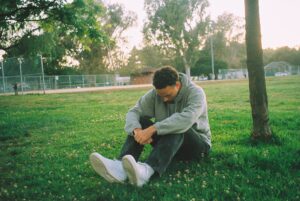
Buzzell-managed artist Ajna
What’s the funniest story you can share with us relating to your work as a manager?
VJ: My background is business marketing for corporate clients so coming into the music industry as a manager was a shock to my system because when I saw the first contract that was presented to Kota I laughed and thought it was a joke. I said no business person I have met over the past 30 years would take this contract seriously. But the funny story is when we were in a meeting with a distributor who was supposed to be the ones to help independent artists, and I asked if they could give me some bullet points of what they were going to do for their percentage and they all looked at each other like they didn’t understand the question. That’s when I knew at that very moment that the percentage is just to upload the music to DSPs, which any artist can do with Tune Core or Distrokid. So they are taking anywhere from 5%-20% of all of your music for just uploading your songs to DSPs. And then they charge you extra to provide services. So what’s the percentage for? I just wish I had a video of all of their faces when I asked that simple question.
SG: There’s honestly too many funny moments to even pick one. Enjoying the process is a huge part of it, and the artists I work with make that pretty easy!
SFP: This might be dark humor more than anything but literally every artist that I moved on from up until this point are either stuck in the same situation or worse than when we stopped working together. It’s funny to me cause all of them were so sure of themselves that they had all the answers and let’s just say anybody who was paying attention can clearly see the difference from when I was working with them and afterwards. But, what would make this even funnier is if any of them blew up beyond our greatest imagination after this interview was published. Lol Today’s Hip Hop has my word that I’ll reveal the artist and expose myself if this happens. Consider this a challenge to them and myself! Haha
JB: The music industry is funny every day, and what I like about being a manager is that every day is a new project that comes with its own funny moments. I don’t want to name-drop anyone but I remember an artist I manage was playing a show we were barely getting paid for as the promoter guaranteed us a crowd to play in front of as the headliner had a strong following. When we showed up the venue was nearly empty besides the 20-30 people we brought in who all left after our set. I remember the promoter when the venue cleared out after our set, we’ve gotten some better opportunities since then. This might be dark humor as well but in music there are constant uncomfortable and sometimes disappointing situations, so I find it best to laugh them off and know it’s temporary in the early stages of a long game.


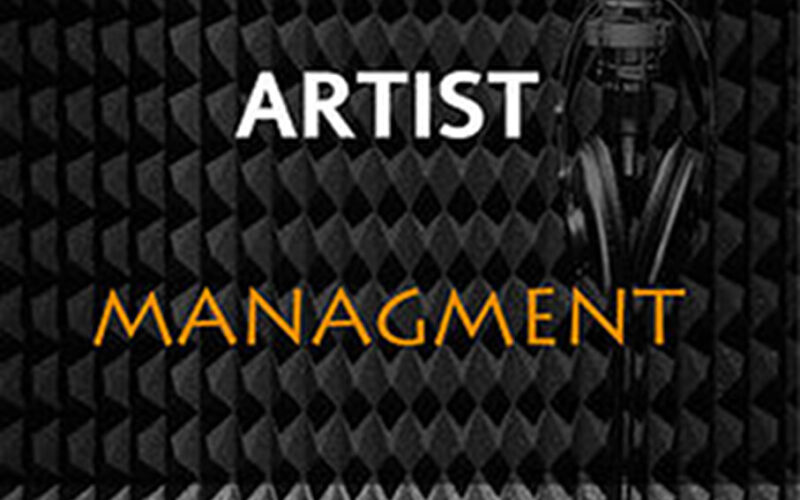


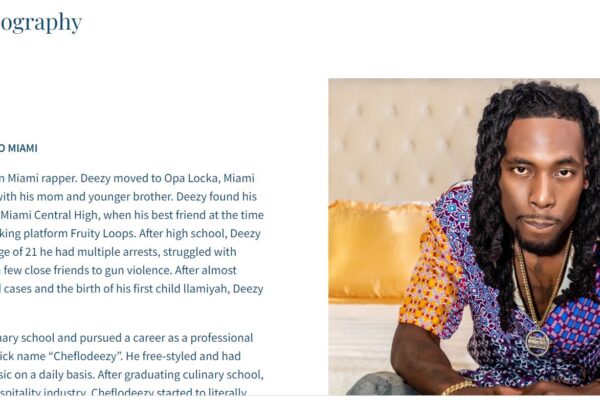
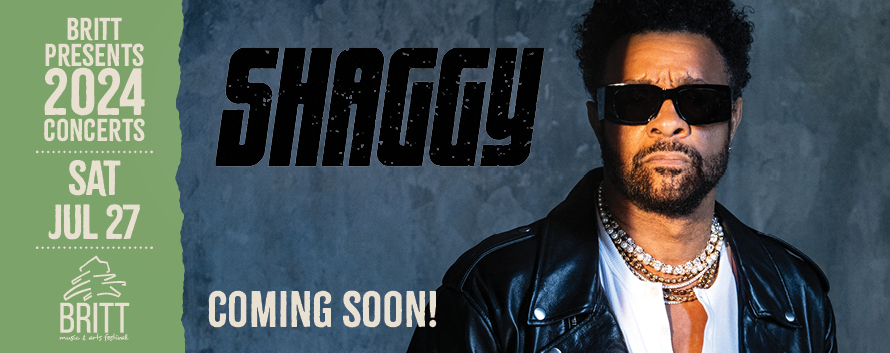
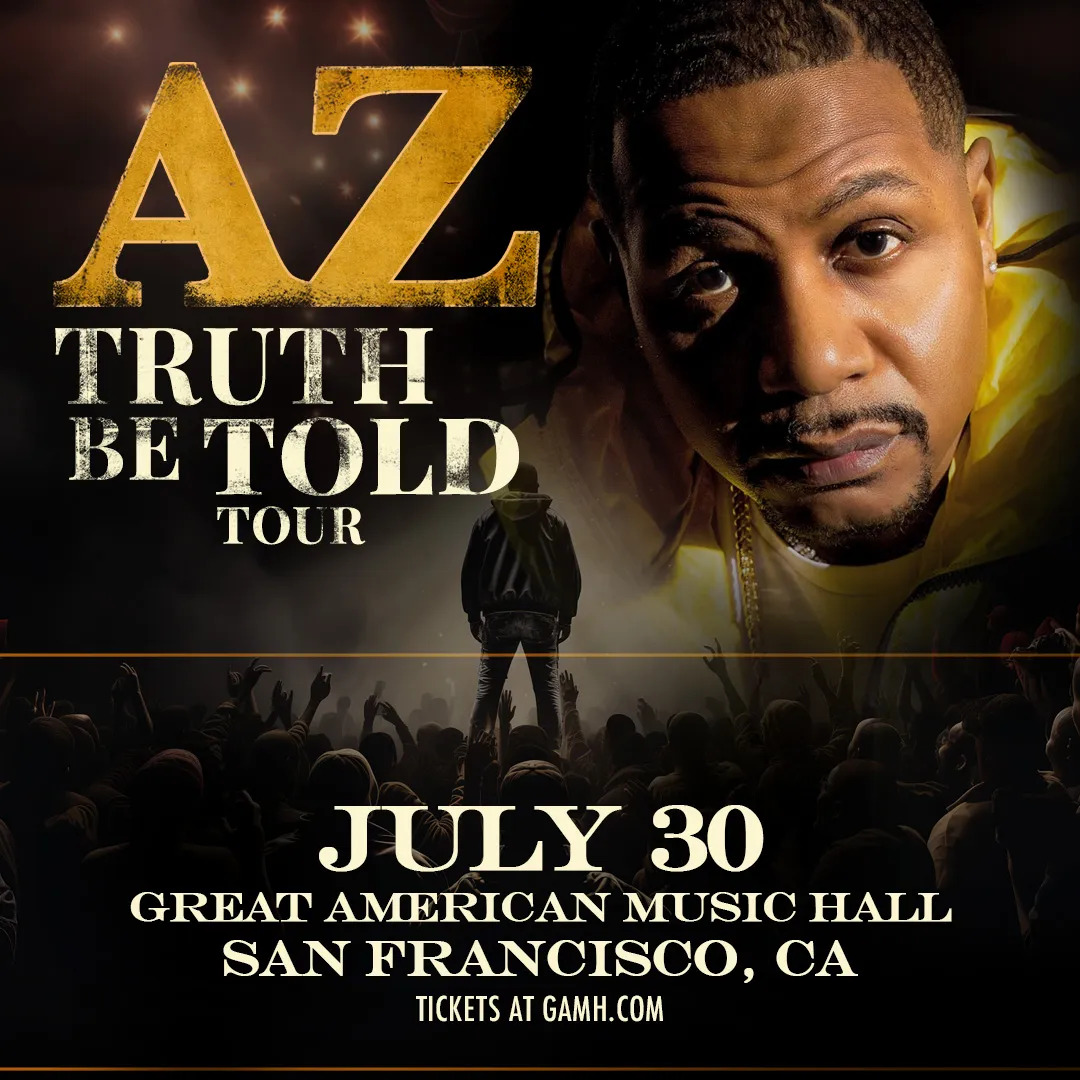
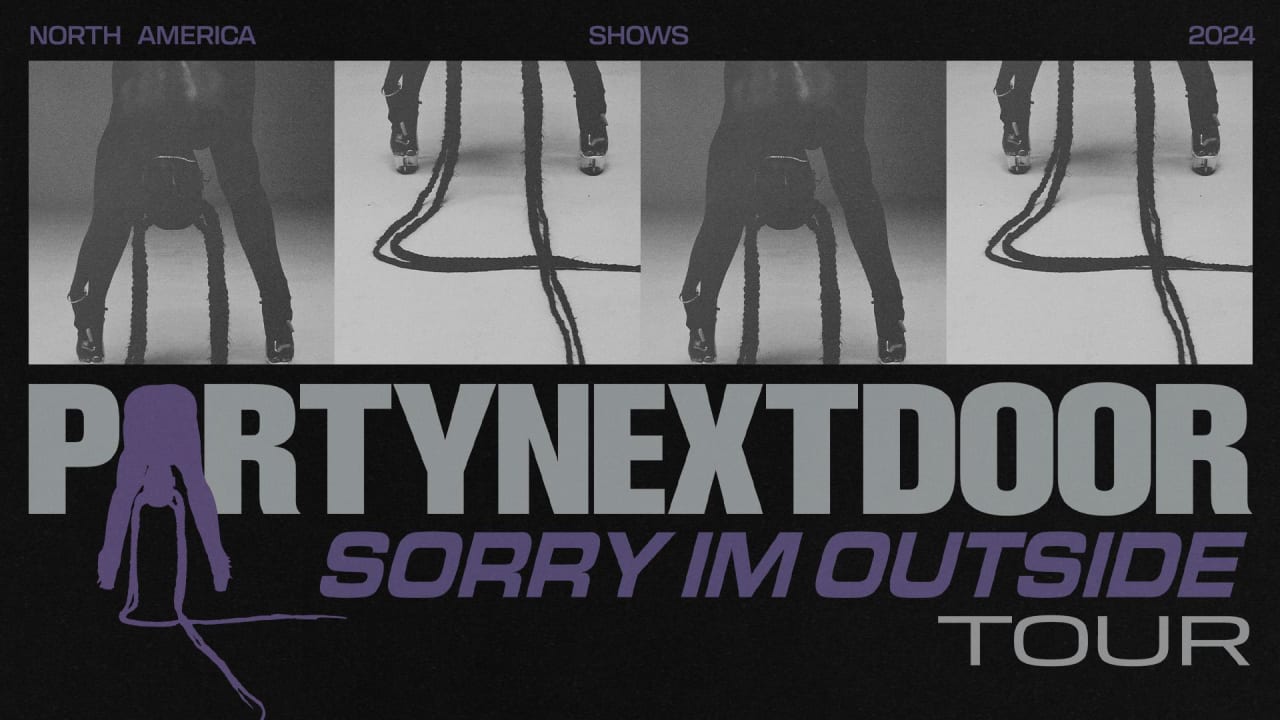


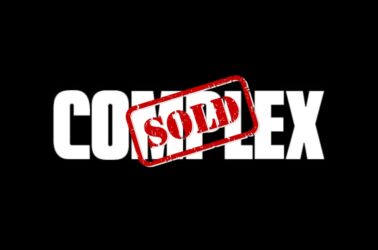
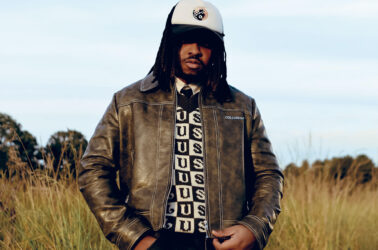
2 thoughts on “Industry Insights from Four, Top Independent Artist Managers”